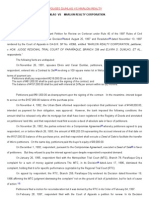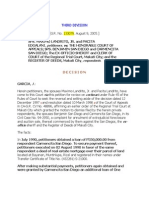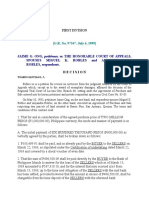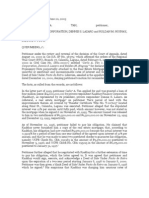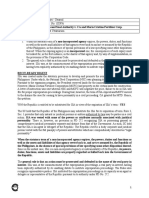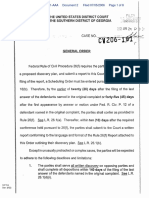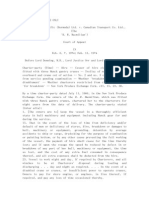OBLICON Cannu V Galang
OBLICON Cannu V Galang
Uploaded by
Czarina Victoria L. CominesCopyright:
Available Formats
OBLICON Cannu V Galang
OBLICON Cannu V Galang
Uploaded by
Czarina Victoria L. CominesOriginal Title
Copyright
Available Formats
Share this document
Did you find this document useful?
Is this content inappropriate?
Copyright:
Available Formats
OBLICON Cannu V Galang
OBLICON Cannu V Galang
Uploaded by
Czarina Victoria L. CominesCopyright:
Available Formats
Cannu vs.
Galang
SECOND DIVISION G.R. No. 139523. May 26, 2005 SPS. FELIPE AND LETICIA CANNU, petitioners, vs. SPS. GIL AND FERNANDINA GALANG AND NATIONAL HOME MORTGAGE FINANCE CORPORATION, respondents. CHICO-NAZARIO, J.: Before Us is a Petition for Review on Certiorari which seeks to set aside the decision [1] of the Court of Appeals dated 30 September 1998 which affirmed with modification the decision of Branch 135 of the Regional Trial Court (RTC) of Makati City, dismissing the complaint for Specific Performance and Damages filed by petitioners, and its Resolution [2] dated 22 July 1999 denying petitioners motion for reconsideration. A complaint [3] for Specific Performance and Damages was filed by petitioners-spouses Felipe and Leticia Cannu against respondents-spouses Gil and Fernandina Galang and the National Home Mortgage Finance Corporation (NHMFC) before Branch 135 of the RTC of Makati, on 24 June 1993. The case was docketed as Civil Case No. 93-2069. The facts that gave rise to the aforesaid complaint are as follows: Respondents-spouses Gil and Fernandina Galang obtained a loan from Fortune Savings & Loan Association for P173,800.00 to purchase a house and lot located at Pulang Lupa, Las Pias, with an area of 150 square meters covered by Transfer Certificate of Title (TCT) No. T-8505 in the names of respondents-spouses. To secure payment, a real estate mortgage was constituted on the said house and lot in favor of Fortune Savings & Loan Association. In early 1990, NHMFC purchased the mortgage loan of respondents-spouses from Fortune Savings & Loan Association for P173,800.00.
1
JUSTINIANO
Cannu vs. Galang
Respondent Fernandina Galang authorized[4] her attorney-in-fact, Adelina R. Timbang, to sell the subject house and lot. Petitioner Leticia Cannu agreed to buy the property for P120,000.00 and to assume the balance of the mortgage obligations with the NHMFC and with CERF Realty[5] (the Developer of the property). Of the P120,000.00, the following payments were made by petitioners:
Date July 19, 1990 March 13, 1991 April 6, 1991 November 28, 1991 Total Amount Paid P40,000.00[6] 15,000.00[7] 15,000.00[8] 5,000.00[9] P75,000.00
Thus, leaving a balance of P45,000.00. A Deed of Sale with Assumption of Mortgage Obligation[10] dated 20 August 1990 was made and entered into by and between spouses Fernandina and Gil Galang (vendors) and spouses Leticia and Felipe Cannu (vendees) over the house and lot in question which contains, inter alia, the following:
NOW, THEREFORE, for and in consideration of the sum of TWO HUNDRED FIFTY THOUSAND PESOS (P250,000.00), Philippine Currency, receipt of which is hereby acknowledged by the Vendors and the assumption of the mortgage obligation, the Vendors hereby sell, cede and transfer unto the Vendees, their heirs, assigns and successor in interest the above-described property together with the existing improvement thereon. It is a special condition of this contract that the Vendees shall assume and continue with the payment of the amortization with the National Home Mortgage Finance Corporation Inc. in the outstanding balance of P_______________, as of __________ and shall comply with and abide by the terms and conditions of the mortgage document dated Feb. 27, 1989 and identified as Doc. No. 82, Page 18, Book VII, S. of 1989 of
Cannu vs. Galang
Notary Public for Quezon City Marites Sto. Tomas Alonzo, as if the Vendees are the original signatories.
2
JUSTINIANO
Cannu vs. Galang
Petitioners opposed the release of TCT No. T-8505 in favor of respondentsspouses insisting that the subject property had already been sold to them. Consequently, the NHMFC held in abeyance the release of said TCT. Thereupon, a Complaint for Specific Performance and Damages was filed asking, among other things, that petitioners (plaintiffs therein) be declared the owners of the property involved subject to reimbursements of the amount made by respondents-spouses (defendants therein) in preterminating the mortgage loan with NHMFC. Respondent NHMFC filed its Answer.[21] It claimed that petitioners have no cause of action against it because they have not submitted the formal requirements to be considered assignees and successors-in-interest of the property under litigation. In their Answer,[22] respondents-spouses alleged that because of petitioners-spouses failure to fully pay the consideration and to update the monthly amortizations with the NHMFC, they paid in full the existing obligations with NHMFC as an initial step in the rescission and annulment of the Deed of Sale with Assumption of Mortgage. In their counterclaim, they maintain that the acts of petitioners in not fully complying with their obligations give rise to rescission of the Deed of Sale with Assumption of Mortgage with the corresponding damages. After trial, the lower court rendered its decision ratiocinating:
On the basis of the evidence on record, testimonial and documentary, this Court is of the view that plaintiffs have no cause of action either against the spouses Galang or the NHMFC. Plaintiffs have admitted on record they failed to pay the amount of P45,000.00 the balance due to the Galangs in consideration of the Deed of Sale With Assumption of Mortgage Obligation (Exhs. C and 3). Consequently, this is a breach of contract and evidently a failure to comply with obligation arising from contracts. . . In this case, NHMFC has not been duly informed due to lack of formal requirements to acknowledge plaintiffs as legal assignees, or legitimate transferees and, therefore, successors-ininterest to the property, plaintiffs should have no legal personality to claim any right to the same property.[23]
Petitioners immediately took possession and occupied the house and lot. Petitioners made the following payments to the NHMFC:
Date July 9, 1990 March 12, 1991 February 4, 1992 March 31, 1993 April 19, 1993 April 27, 1993 Amount P 14,312.47 8,000.00 10,000.00 6,000.00 10,000.00 7,000.00 P 55,312.47 Receipt No. D-503986[11] D-729478[12] D-999127[13] E-563749[14] E-582432[15] E-618326[16]
Petitioners paid the equity or second mortgage to CERF Realty.[17] Despite requests from Adelina R. Timbang and Fernandina Galang to pay the balance of P45,000.00 or in the alternative to vacate the property in question, petitioners refused to do so. In a letter[18] dated 29 March 1993, petitioner Leticia Cannu informed Mr. Fermin T. Arzaga, Vice President, Fund Management Group of the NHMFC, that the ownership rights over the land covered by TCT No. T8505 in the names of respondents-spouses had been ceded and transferred to her and her husband per Deed of Sale with Assumption of Mortgage, and that they were obligated to assume the mortgage and pay the remaining unpaid loan balance. Petitioners formal assumption of mortgage was not approved by the NHMFC.[19] Because the Cannus failed to fully comply with their obligations, respondent Fernandina Galang, on 21 May 1993, paidP233,957.64 as full payment of her remaining mortgage loan with NHMFC.[20]
Cannu vs. Galang
The decretal portion of the decision reads:
Premises considered, the foregoing complaint has not been proven even by preponderance of evidence, and, as such, plaintiffs have no cause of action against the defendants herein. The above-entitled case is ordered dismissed for lack of merit. Judgment is hereby rendered by way of counterclaim, in favor of defendants and against plaintiffs, to wit: 1. Ordering the Deed of Sale With Assumption of Mortgage Obligation (Exhs. C and 3) rescinded and hereby declared the same as nullified without prejudice for defendants-spouses Galang to return the partial payments made by plaintiffs; and the plaintiffs are ordered, on the other hand, to return the physical and legal possession of the subject property to spouses Galang by way of mutual restitution; 2. To pay defendants spouses Galang and NHMFC, each the amount of P10,000.00 as litigation expenses, jointly and severally; 3. To pay attorneys fees to defendants in the amount of P20,000.00, jointly and severally; and 4. 5. The costs of suit. No moral and exemplary damages awarded.[24]
3
JUSTINIANO
Cannu vs. Galang
Records show that upon the execution of the Contract of Sale or on July 19, 1990 plaintiffs-appellants paid defendants-appellees spouses Galang the amount of only P40,000.00. The next payment was made by plaintiffs-appellants on March 13, 1991 or eight (8) months after the execution of the contract. Plaintiffsappellants paid the amount of P5,000.00. The next payment was made on April 6, 1991 for P15,000.00 and on November 28, 1991, for another P15,000.00. From 1991 until the present, no other payments were made by plaintiffsappellants to defendants-appellees spouses Galang. Out of the P250,000.00 purchase price which was supposed to be paid on the day of the execution of contract in July, 1990 plaintiffs-appellants have paid, in the span of eight (8) years, from 1990 to present, the amount of only P75,000.00. Plaintiffs-appellants should have paid the P250,000.00 at the time of the execution of contract in 1990. Eight (8) years have already lapsed and plaintiffs-appellants have not yet complied with their obligation. We consider this breach to be substantial. The tender made by plaintiffs-appellants after the filing of this case, of the Managerial Check in the amount of P278,957.00 dated January 24, 1994 cannot be considered as an effective mode of payment. Performance or payment may be effected not by tender of payment alone but by both tender and consignation. It is consignation which is essential in order to extinguish plaintiffs-appellants obligation to pay the balance of the purchase price. In addition, plaintiffs-appellants failed to comply with their obligation to pay the monthly amortizations due on the mortgage. In the span of three (3) years from 1990 to 1993, plaintiffs-appellants made only six payments. The payments made by plaintiffs-appellants are not even sufficient to answer for the arrearages, interests and penalty charges.
A Motion for Reconsideration[25] was filed, but same was denied. Petitioners appealed the decision of the RTC to the Court of Appeals. On 30 September 1998, the Court of Appeals disposed of the appeal as follows:
Obligations arising from contract have the force of law between the contracting parties and should be complied in good faith. The terms of a written contract are binding on the parties thereto. Plaintiffs-appellants therefore are under obligation to pay defendantsappellees spouses Galang the sum of P250,000.00, and to assume the mortgage.
Cannu vs. Galang
On account of these circumstances, the rescission of the Contract of Sale is warranted and justified. ... WHEREFORE, foregoing considered, the appealed decision is hereby AFFIRMED with modification. Defendants-appellees spouses Galang are hereby ordered to return the partial payments made by plaintiffappellants in the amount of P135,000.00. No pronouncement as to cost.[26]
4
JUSTINIANO
Cannu vs. Galang
4. THE HONORABLE COURT OF APPEALS ERRED WHEN IT FAILED TO CONSIDER THAT THE ACTION FOR RESCISSION IS SUBSIDIARY.[29] Before discussing the errors allegedly committed by the Court of Appeals, it must be stated a priori that the latter made a misappreciation of evidence regarding the consideration of the property in litigation when it relied solely on the Deed of Sale with Assumption of Mortgage executed by the respondents-spouses Galang and petitioners-spouses Cannu. As above-quoted, the consideration for the house and lot stated in the Deed of Sale with Assumption of Mortgage is P250,000.00, plus the assumption of the balance of the mortgage loan with NHMFC. However, after going over the record of the case, more particularly the Answer of respondentsspouses, the evidence shows the consideration therefor is P120,000.00, plus the payment of the outstanding loan mortgage with NHMFC, and of the equity or second mortgage with CERF Realty (Developer of the property).[30] Nowhere in the complaint and answer of the petitioners-spouses Cannu and respondents-spouses Galang shows that the consideration is P250,000.00. In fact, what is clear is that of the P120,000.00 to be paid to the latter, only P75,000.00 was paid to Adelina Timbang, the spouses Galangs attorney-in-fact. This debunks the provision in the Deed of Sale with Assumption of Mortgage that the amount of P250,000.00 has been received by petitioners. Inasmuch as the Deed of Sale with Assumption of Mortgage failed to express the true intent and agreement of the parties regarding its consideration, the same should not be fully relied upon. The foregoing facts lead us to hold that the case on hand falls within one of the recognized exceptions to the parole evidence rule. Under the Rules of Court, a party may present evidence to modify, explain or add to the terms of the written
The motion for reconsideration[27] filed by petitioners was denied by the Court of Appeals in a Resolution[28] dated 22 July 1999. Hence, this Petition for Certiorari. Petitioners raise the following assignment of errors: 1. THE HONORABLE COURT OF APPEALS ERRED WHEN IT HELD THAT PETITIONERS BREACH OF THE OBLIGATION WAS SUBSTANTIAL. 2. THE HONORABLE COURT OF APPEALS ERRED WHEN IN EFFECT IT HELD THAT THERE WAS NO SUBSTANTIAL COMPLIANCE WITH THE OBLIGATION TO PAY THE MONTHLY AMORTIZATION WITH NHMFC. 3. THE HONORABLE COURT OF APPEALS ERRED WHEN IT FAILED TO CONSIDER THE OTHER FACTS AND CIRCUMSTANCES THAT MILITATE AGAINST RESCISSION.
Cannu vs. Galang
agreement if he puts in issue in his pleading, among others, its failure to express the true intent and agreement of the parties thereto.[31] In the case at bar, when respondents-spouses enumerated in their Answer the terms and conditions for the sale of the property under litigation, which is different from that stated in the Deed of Sale with Assumption with Mortgage, they already put in issue the matter of consideration. Since there is a difference as to what the true consideration is, this Court has admitted evidence aliunde to explain such inconsistency. Thus, the Court has looked into the pleadings and testimonies of the parties to thresh out the discrepancy and to clarify the intent of the parties. As regards the computation[32] of petitioners as to the breakdown of the P250,000.00 consideration, we find the same to be self-serving and unsupported by evidence. On the first assigned error, petitioners argue that the Court erred when it ruled that their breach of the obligation was substantial. Settled is the rule that rescission or, more accurately, resolution,[33] of a party to an obligation under Article 1191[34] is predicated on a breach of faith by the other party that violates the reciprocity between them.[35] Article 1191 reads:
Art. 1191. The power to rescind obligations is implied in reciprocal ones, in case one of the obligors should not comply with what is incumbent upon him. The injured party may choose between the fulfillment and the rescission of the obligation, with the payment of damages in either case. He may also seek rescission, even after he has chosen fulfillment, if the latter should become impossible. The court shall decree the rescission claimed, unless there be just cause authorizing the fixing of a period.
5
JUSTINIANO
Cannu vs. Galang
Rescission will not be permitted for a slight or casual breach of the contract. Rescission may be had only for such breaches that are substantial and fundamental as to defeat the object of the parties in making the agreement.[36] The question of whether a breach of contract is substantial depends upon the attending circumstances[37] and not merely on the percentage of the amount not paid. In the case at bar, we find petitioners failure to pay the remaining balance of P45,000.00 to be substantial. Even assuming arguendo that only said amount was left out of the supposed consideration of P250,000.00, or eighteen (18%) percent thereof, this percentage is still substantial. Taken together with the fact that the last payment made was on 28 November 1991, eighteen months before the respondent Fernandina Galang paid the outstanding balance of the mortgage loan with NHMFC, the intention of petitioners to renege on their obligation is utterly clear. Citing Massive Construction, Inc. v. Intermediate Appellate Court,[38] petitioners ask that they be granted additional time to complete their obligation. Under the facts of the case, to give petitioners additional time to comply with their obligation will be putting premium on their blatant noncompliance of their obligation. They had all the time to do what was required of them (i.e., pay the P45,000.00 balance and to properly assume the mortgage loan with the NHMFC), but still they failed to comply. Despite demands for them to pay the balance, no payments were made.[39] The fact that petitioners tendered a Managers Check to respondentsspouses Galang in the amount of P278,957.00 seven months after the filing of this case is of no moment. Tender of payment does not by itself produce legal payment, unless it is completed by consignation.[40] Their failure to fulfill their obligation gave the respondents-spouses Galang the right to rescission. Anent the second assigned error, we find that petitioners were not religious in paying the amortization with the NHMFC. As admitted by them, in the span of three years from 1990 to 1993, their payments covered only thirty
Cannu vs. Galang
months.[41] This, indeed, constitutes another breach or violation of the Deed of Sale with Assumption of Mortgage. On top of this, there was no formal assumption of the mortgage obligation with NHMFC because of the lack of approval by the NHMFC[42] on account of petitioners nonsubmission of requirements in order to be considered as assignees/successors-in-interest over the property covered by the mortgage obligation.[43] On the third assigned error, petitioners claim there was no clear evidence to show that respondents-spouses Galang demanded from them a strict and/or faithful compliance of the Deed of Sale with Assumption of Mortgage. We do not agree. There is sufficient evidence showing that demands were made from petitioners to comply with their obligation. Adelina R. Timbang, attorneyin-fact of respondents-spouses, per instruction of respondent Fernandina Galang, made constant follow-ups after the last payment made on 28 November 1991, but petitioners did not pay.[44] Respondent Fernandina Galang stated in her Answer[45] that upon her arrival from America in October 1992, she demanded from petitioners the complete compliance of their obligation by paying the full amount of the consideration (P120,000.00) or in the alternative to vacate the property in question, but still, petitioners refused to fulfill their obligations under the Deed of Sale with Assumption of Mortgage. Sometime in March 1993, due to the fact that full payment has not been paid and that the monthly amortizations with the NHMFC have not been fully updated, she made her intentions clear with petitioner Leticia Cannu that she will rescind or annul the Deed of Sale with Assumption of Mortgage. We likewise rule that there was no waiver on the part of petitioners to demand the rescission of the Deed of Sale with Assumption of Mortgage. The fact that respondents-spouses accepted, through their attorney-in-fact, payments in installments does not constitute waiver on their part to exercise their right to rescind the Deed of Sale with Assumption of Mortgage.
6
JUSTINIANO
Cannu vs. Galang
Adelina Timbang merely accepted the installment payments as an accommodation to petitioners since they kept on promising they would pay. However, after the lapse of considerable time (18 months from last payment) and the purchase price was not yet fully paid, respondentsspouses exercised their right of rescission when they paid the outstanding balance of the mortgage loan with NHMFC. It was only after petitioners stopped paying that respondents-spouses moved to exercise their right of rescission. Petitioners cite the case of Angeles v. Calasanz[46] to support their claim that respondents-spouses waived their right to rescind. We cannot apply this case since it is not on all fours with the case before us. First, in Angeles, the breach was only slight and casual which is not true in the case before us. Second, in Angeles, the buyer had already paid more than the principal obligation, while in the instant case, the buyers (petitioners) did not pay P45,000.00 of the P120,000.00 they were obligated to pay. We find petitioners statement that there is no evidence of prejudice or damage to justify rescission in favor of respondents-spouses to be unfounded. The damage suffered by respondents-spouses is the effect of petitioners failure to fully comply with their obligation, that is, their failure to pay the remaining P45,000.00 and to update the amortizations on the mortgage loan with the NHMFC. Petitioners have in their possession the property under litigation. Having parted with their house and lot, respondents-spouses should be fully compensated for it, not only monetarily, but also as to the terms and conditions agreed upon by the parties. This did not happen in the case before us. Citing Seva v. Berwin & Co., Inc.,[47] petitioners argue that no rescission should be decreed because there is no evidence on record that respondent Fernandina Galang is ready, willing and able to comply with her own obligation to restore to them the total payments they made. They added that no allegation to that effect is contained in respondents-spouses Answer. We find this argument to be misleading.
Cannu vs. Galang
First, the facts obtaining in Seva case do not fall squarely with the case on hand. In the former, the failure of one party to perform his obligation was the fault of the other party, while in the case on hand, failure on the part of petitioners to perform their obligation was due to their own fault. Second, what is stated in the book of Justice Edgardo L. Paras is [i]t (referring to the right to rescind or resolve) can be demanded only if the plaintiff is ready, willing and able to comply with his own obligation, and the other is not. In other words, if one party has complied or fulfilled his obligation, and the other has not, then the former can exercise his right to rescind. In this case, respondents-spouses complied with their obligation when they gave the possession of the property in question to petitioners. Thus, they have the right to ask for the rescission of the Deed of Sale with Assumption of Mortgage. On the fourth assigned error, petitioners, relying on Article 1383 of the Civil Code, maintain that the Court of Appeals erred when it failed to consider that the action for rescission is subsidiary. Their reliance on Article 1383 is misplaced. The subsidiary character of the action for rescission applies to contracts enumerated in Articles 1381[48] of the Civil Code. The contract involved in the case before us is not one of those mentioned therein. The provision that applies in the case at bar is Article 1191. In the concurring opinion of Justice Jose B.L. Reyes in Universal Food Corp. v. Court of Appeals,[49] rescission under Article 1191 was distinguished from rescission under Article 1381. Justice J.B.L. Reyes said:
. . . The rescission on account of breach of stipulations is not predicated on injury to economic interests of the party plaintiff but on the breach of faith by the defendant, that violates the reciprocity between the parties. It is not a subsidiary action, and Article 1191 may be scanned without disclosing anywhere that the action for rescission thereunder is subordinated to anything other than the culpable breach of his obligations by the defendant. This rescission is a principal action
7
JUSTINIANO
Cannu vs. Galang
retaliatory in character, it being unjust that a party be held bound to fulfill his promises when the other violates his. As expressed in the old Latin aphorism: Non servanti fidem, non est fides servanda. Hence, the reparation of damages for the breach is purely secondary. On the contrary, in the rescission by reason of lesion or economic prejudice, the cause of action is subordinated to the existence of that prejudice, because it is the raison d tre as well as the measure of the right to rescind. Hence, where the defendant makes good the damages caused, the action cannot be maintained or continued, as expressly provided in Articles 1383 and 1384. But the operation of these two articles is limited to the cases of rescission for lesion enumerated in Article 1381 of the Civil Code of the Philippines, and does not apply to cases under Article 1191.
From the foregoing, it is clear that rescission (resolution in the Old Civil Code) under Article 1191 is a principal action, while rescission under Article 1383 is a subsidiary action. The former is based on breach by the other party that violates the reciprocity between the parties, while the latter is not. In the case at bar, the reciprocity between the parties was violated when petitioners failed to fully pay the balance of P45,000.00 to respondentsspouses and their failure to update their amortizations with the NHMFC. Petitioners maintain that inasmuch as respondents-spouses Galang were not granted the right to unilaterally rescind the sale under the Deed of Sale with Assumption of Mortgage, they should have first asked the court for the rescission thereof before they fully paid the outstanding balance of the mortgage loan with the NHMFC. They claim that such payment is a unilateral act of rescission which violates existing jurisprudence. In Tan v. Court of Appeals,[50] this court said:
. . . [T]he power to rescind obligations is implied in reciprocal ones in case one of the obligors should not comply with what is incumbent upon him is clear from a reading of the Civil Code provisions. However, it is equally settled that, in the absence of a stipulation to the contrary, this power must be invoked judicially; it cannot be exercised solely on a
Cannu vs. Galang
partys own judgment that the other has committed a breach of the obligation. Where there is nothing in the contract empowering the petitioner to rescind it without resort to the courts, the petitioners action in unilaterally terminating the contract in this case is unjustified.
8
JUSTINIANO
Cannu vs. Galang
WHEREFORE, premises considered, the decision of the Court of Appeals is hereby AFFIRMED with MODIFICATION. Spouses Gil and Fernandina Galang are hereby ordered to return the partial payments made by petitioners in the amount of P165,312.47. With costs. SO ORDERED. Puno, Acting C.J., (Chairman), Austria-Martinez, and Callejo, Sr., JJ., concur. Tinga, J., out of the country.
It is evident that the contract under consideration does not contain a provision authorizing its extrajudicial rescission in case one of the parties fails to comply with what is incumbent upon him. This being the case, respondents-spouses should have asked for judicial intervention to obtain a judicial declaration of rescission. Be that as it may, and considering that respondents-spouses Answer (with affirmative defenses) with Counterclaim seeks for the rescission of the Deed of Sale with Assumption of Mortgage, it behooves the court to settle the matter once and for all than to have the case re-litigated again on an issue already heard on the merits and which this court has already taken cognizance of. Having found that petitioners seriously breached the contract, we, therefore, declare the same is rescinded in favor of respondents-spouses. As a consequence of the rescission or, more accurately, resolution of the Deed of Sale with Assumption of Mortgage, it is the duty of the court to require the parties to surrender whatever they may have received from the other. The parties should be restored to their original situation.[51] The record shows petitioners paid respondents-spouses the amount of P75,000.00 out of the P120,000.00 agreed upon. They also made payments to NHMFC amounting to P55,312.47. As to the petitioners alleged payment to CERF Realty of P46,616.70, except for petitioner Leticia Cannus bare allegation, we find the same not to be supported by competent evidence. As a general rule, one who pleads payment has the burden of proving it.[52] However, since it has been admitted in respondents-spouses Answer that petitioners shall assume the second mortgage with CERF Realty in the amount of P35,000.00, and that Adelina Timbang, respondents-spouses very own witness, testified[53] that same has been paid, it is but proper to return this amount to petitioners. The three amounts total P165,312.47 -- the sum to be returned to petitioners.
Cannu vs. Galang
[1] CA Rollo, pp. 50-56; Penned by Associate Justice Eugenio S. Labitoria with Associate Justices Jesus M. Elbinias and Marina L. Buzon, concurring. [2] Id., at 77. [3] Records, pp. 1-12. [4] Exh. A; Records, p. 141. [5] The records do not disclose the nature of the transaction between respondents-spouses and CERF Realty. [6] Exh. G-1; Records, p. 149.
9
JUSTINIANO
Cannu vs. Galang
[19] TSN, 13 October 1994, p. 37; Answer with Affirmative Defense of NHMFC, Records, p. 29. [20] Exhs. L and L-1; Records, p. 162. [21] Records, pp. 28-30. [22] Id., pp. 38-45. [23] Rollo, pp. 60-61. [24] Rollo, pp. 61-62. [25] Records, p. 229.
[7] Exh. G-3; Id., p. 150. [26] Rollo, pp. 38-40. [8] Exh. G-4; Id., p. 152. [27] Id., pp. 57-68. [9] Exh. G-2; Id., p. 150. [28] Id., p. 77. [10] Exh. C; Records, pp. 144-145. [29] Rollo, pp. 18-19. [11] Exh. I-1; Id., p. 154. [12] Exh. I-3; Id., p. 155. [13] Exh. I-6; Id., p. 157. [14] Exh. I-2; Id., p. 155. [32] Exh. H; Records, p. 153. [15] Exh. I-5; Id., p. 156. [33] As used in the Old Civil Code. [16] Exh. I-4; Id. [34] Civil Code. [17] TSN, 13 October 1994, pp. 41-42. [18] Exh. F; Records, p. 148. [35] Uy v. Court of Appeals, G.R. No. 120465, 09 September 1999, 314 SCRA 69, 81; Romero v. Court of Appeals, G.R. No. 107207, 23 November 1995, 250 SCRA 223, 235. [30] TSN, 13 October 1994, pp. 41-42; 09 November 1994, p. 19; Complaint, p. 2, Records, p. 2; Answer of Respondents-spouses Galang, p. 3, Records, p. 40. [31] American Home Assurance Co. v. Tantuco Enterprises, Inc., G.R. No. 138941, 08 October 2001, 366 SCRA 740, 746-747.
Cannu vs. Galang
[36] Ang v. Court of Appeals, G.R. No. 80058, 13 February 1989, 170 SCRA 286, 296; Tan v. Court of Appeals, G.R. No. 80479, 28 July 1989, 175 SCRA 656, 663. [37] Intestate Estate of the Late Ricardo P. Presbitero, Sr. v. Court of Appeals, G.R. No. 102432, 21 January 1993, 217 SCRA 372, 384. [38] G.R. Nos. 70310-11, 01 June 1993, 223 SCRA 1, 10.
10
JUSTINIANO
Cannu vs. Galang
(4) Those which refer to things under litigation if they have been entered into by the defendant without the knowledge and approval of the litigants or of competent judicial authority; (5) All other contracts specially declared by law to be subject to rescission. [49] G.R. No. L-29155, 13 May 1970, 33 SCRA 1, 22-23.
[39] TSN, 09 November 1994, pp. 12, 16. [50] G.R. No. 80479, 28 July 1989, 175 SCRA 656, 661-662. [40] Philippine National Bank v. Relativo, G.R. No. L-5298, 29 October 1952, 92 Phil. 203, 206. [41] Rollo, p. 25. [42] TSN, 13 October 1994, p. 37. [53] TSN, 09 November 1994, p. 19. [43] Records, p. 29. [44] TSN, 09 November 1994, p. 12. [45] Records, pp. 41-42. [46] G.R. No. L-42283, 18 March 1985, 135 SCRA 323, 332. [47] 48 Phil. 581; Civil Code of the Philippines by Paras, Vol. 4 (1994 Ed). [48] Art. 1381. The following contracts are rescissible: (1) Those which are entered into by guardians whenever the wards whom they represent suffer lesion by more than one-fourth of the value of the things which are the object thereof; (2) Those agreed upon in representation of absentees, if the latter suffer the lesion stated in the preceding number; (3) Those undertaken in fraud of creditors when the latter cannot in any other manner collect the claim due them; [51] Ang v. Court of Appeals, G.R. No. 80058, 13 February 1989, 170 SCRA 286, 297. [52] Jimenez v. National Labor Relations Commission, G.R. No. 116960, 02 April 1996, 256 SCRA 84, 89.
You might also like
- 013 Sps Beltran Vs Sps Cangayda - G.R. No. 225033Document13 pages013 Sps Beltran Vs Sps Cangayda - G.R. No. 225033Paul ToguayNo ratings yet
- Civ Pro MapDocument1 pageCiv Pro MapXavier Hawkins Lopez ZamoraNo ratings yet
- Script Submission Agreement and ReleaseDocument3 pagesScript Submission Agreement and ReleasewarnerloweNo ratings yet
- 1191 - Rescission/ResolutionDocument47 pages1191 - Rescission/ResolutionMarry SuanNo ratings yet
- Sps Felipe and Leticia Cannu Vs Sps Gil and Fernandina Galang Et AlDocument12 pagesSps Felipe and Leticia Cannu Vs Sps Gil and Fernandina Galang Et Almondaytuesday17No ratings yet
- Sps Canu Vs Sps GalangDocument12 pagesSps Canu Vs Sps GalangRodel Cadorniga Jr.No ratings yet
- Cannu V GalangDocument15 pagesCannu V GalangthebluesharpieNo ratings yet
- Cannu v. GalangDocument5 pagesCannu v. Galangtricia dacsNo ratings yet
- 1191 CasesDocument44 pages1191 CasesMarry SuanNo ratings yet
- Petitioners Vs Vs Respondents: Second DivisionDocument12 pagesPetitioners Vs Vs Respondents: Second DivisionSarahNo ratings yet
- 3 Cannu v. GalangDocument12 pages3 Cannu v. GalangRobyn BangsilNo ratings yet
- MANUEL - Nov. 7Document14 pagesMANUEL - Nov. 7JERU SHALLOM MANUELNo ratings yet
- Villanueva Vs GonzagaDocument7 pagesVillanueva Vs GonzagaJustine Vincent PascualNo ratings yet
- Villanueva vs. Gonzaga 498 SCRA 285Document8 pagesVillanueva vs. Gonzaga 498 SCRA 285Eunice Anne MitoNo ratings yet
- Gochan Vs GochanDocument8 pagesGochan Vs GochanpyulovincentNo ratings yet
- Obligations To Do Villanueva v. Gonzaga 498 Scra 285Document6 pagesObligations To Do Villanueva v. Gonzaga 498 Scra 285HERNANDO REYESNo ratings yet
- G.R. No. 129227. May 30, 2000Document9 pagesG.R. No. 129227. May 30, 2000Jeannie AmisolaNo ratings yet
- Power Commercial and Industrial Corporation Vs Ca - GR 119745 - June 20, 1997Document4 pagesPower Commercial and Industrial Corporation Vs Ca - GR 119745 - June 20, 1997BerniceAnneAseñas-Elmaco100% (1)
- Case Digest - Norton ResourcesDocument16 pagesCase Digest - Norton ResourcesPatrick Medina100% (1)
- Conchita Nool Et Al Vs Court of Appeals EtDocument7 pagesConchita Nool Et Al Vs Court of Appeals EtJunalyn BuesaNo ratings yet
- RFBT 1 Case DigestDocument21 pagesRFBT 1 Case DigestAshley MaeNo ratings yet
- Diona v. Balergue - 688 SCRA 22 PDFDocument8 pagesDiona v. Balergue - 688 SCRA 22 PDFLyra ValdezNo ratings yet
- PCIC V CA Full TextDocument10 pagesPCIC V CA Full TextJohn Kelly RemolazoNo ratings yet
- Supreme CourtDocument6 pagesSupreme CourtpiptipaybNo ratings yet
- Diona v. Balangue, G.R. No. 173559, January 7, 2013Document9 pagesDiona v. Balangue, G.R. No. 173559, January 7, 2013Alan Vincent FontanosaNo ratings yet
- Distinction Art 1191 and 1381Document11 pagesDistinction Art 1191 and 1381DawiNo ratings yet
- 6 Lloyd's Enterprises and Credit Corp Vs Dolleton PDFDocument10 pages6 Lloyd's Enterprises and Credit Corp Vs Dolleton PDFYen YenNo ratings yet
- 78 - Wee vs. de Castro 562 SCRA 695Document8 pages78 - Wee vs. de Castro 562 SCRA 695Patrice ThiamNo ratings yet
- Oblicon Digests 111811Document31 pagesOblicon Digests 111811Annie LajarcaNo ratings yet
- Nool Vs CaDocument5 pagesNool Vs CaRose Ann CalanglangNo ratings yet
- Lorenzo Shipping Corp. V BJ MarthelDocument14 pagesLorenzo Shipping Corp. V BJ MarthelthebluesharpieNo ratings yet
- Landrito Vs Court of AppealsDocument8 pagesLandrito Vs Court of AppealsacaylarveronicayahooNo ratings yet
- Metrobank Vs CA 1999Document2 pagesMetrobank Vs CA 1999Al DrinNo ratings yet
- Limaco v. Shonan Gakuen Children's House Phil. Inc.Document8 pagesLimaco v. Shonan Gakuen Children's House Phil. Inc.Cassie GacottNo ratings yet
- Cordero Vs FS Management - Contract To Sell Not RescisiibleDocument5 pagesCordero Vs FS Management - Contract To Sell Not RescisiibleFacio BoniNo ratings yet
- Lorenzo Shipping Corp V BJ Marthel IntlDocument14 pagesLorenzo Shipping Corp V BJ Marthel IntlMJ BautistaNo ratings yet
- 2 - GR - 225033Document10 pages2 - GR - 225033Emmanuel Enrico de VeraNo ratings yet
- Full Case - Valarao VS CaDocument7 pagesFull Case - Valarao VS CaDaveKarlRamada-MaraonNo ratings yet
- Sales CasesDocument107 pagesSales CasesLorraine DianoNo ratings yet
- Gr. 130347Document10 pagesGr. 130347Ysrael Ysaac CroixNo ratings yet
- Cases 1-12Document46 pagesCases 1-12RoyJohnMalaluanNo ratings yet
- Civ Pro 2Document35 pagesCiv Pro 2Tammy YahNo ratings yet
- II A Villena V Spouses Chavez 415 SCRA 33 2003Document4 pagesII A Villena V Spouses Chavez 415 SCRA 33 2003Kristell FerrerNo ratings yet
- Ong vs. CADocument8 pagesOng vs. CAVilpa VillabasNo ratings yet
- Conchita Nool and Gaudencio Almojera, Petitioner, vs. Court of Appeals, Anacleto Nool and Emilia Nebre, RespondentsDocument10 pagesConchita Nool and Gaudencio Almojera, Petitioner, vs. Court of Appeals, Anacleto Nool and Emilia Nebre, RespondentswencyNo ratings yet
- 161908-2008-Lloyd S Enterprises Corp. v. Spouses20170514-911-3rtodjDocument8 pages161908-2008-Lloyd S Enterprises Corp. v. Spouses20170514-911-3rtodjOke HarunoNo ratings yet
- Solid Homes V TanDocument8 pagesSolid Homes V TanthebluesharpieNo ratings yet
- Cases in Civil Pro Under AnswerDocument45 pagesCases in Civil Pro Under AnswerElla RotsapNo ratings yet
- Flancia v. CADocument6 pagesFlancia v. CAEdward StewartNo ratings yet
- Limaco v. Shonan Gakuen Children's House Phil. Inc., G.R.no. 158245, June 30, 2005Document7 pagesLimaco v. Shonan Gakuen Children's House Phil. Inc., G.R.no. 158245, June 30, 2005JenniferPizarrasCadiz-CarullaNo ratings yet
- PCI Leasing & Finance Inc. v. SPS DaiDocument9 pagesPCI Leasing & Finance Inc. v. SPS Daifaye wongNo ratings yet
- #19 G.R. No. L-23072Document4 pages#19 G.R. No. L-23072Jheza Catalina Tee - DimayugaNo ratings yet
- SPS. VALENZUELA v. KALAYAANDocument3 pagesSPS. VALENZUELA v. KALAYAANAlfonso Miguel DimlaNo ratings yet
- Sales Cases (Formation of Sale)Document67 pagesSales Cases (Formation of Sale)Danielle ManguneNo ratings yet
- Oblicon Some CasesDocument10 pagesOblicon Some CasesmehNo ratings yet
- Juris (Constructive Delivery)Document48 pagesJuris (Constructive Delivery)ALVNo ratings yet
- Heirs of Ignacio Vs Home BankersDocument8 pagesHeirs of Ignacio Vs Home Bankersbrida athenaNo ratings yet
- Villarta V TalaveraDocument2 pagesVillarta V TalaveraRobert RosalesNo ratings yet
- Petition for Certiorari – Patent Case 99-396 - Federal Rule of Civil Procedure 12(h)(3) Patent Assignment Statute 35 USC 261From EverandPetition for Certiorari – Patent Case 99-396 - Federal Rule of Civil Procedure 12(h)(3) Patent Assignment Statute 35 USC 261No ratings yet
- Supreme Court Eminent Domain Case 09-381 Denied Without OpinionFrom EverandSupreme Court Eminent Domain Case 09-381 Denied Without OpinionNo ratings yet
- Petition for Certiorari Denied Without Opinion: Patent Case 98-1972.From EverandPetition for Certiorari Denied Without Opinion: Patent Case 98-1972.No ratings yet
- Crimpro Notes Chapter 1Document17 pagesCrimpro Notes Chapter 1Czarina Victoria L. CominesNo ratings yet
- Evidence Cases (Extrajudicial Confessions)Document59 pagesEvidence Cases (Extrajudicial Confessions)Czarina Victoria L. Comines100% (1)
- Election Cases DigestsDocument23 pagesElection Cases DigestsCzarina Victoria L. CominesNo ratings yet
- Civ Rev SC Rulings (1 51)Document51 pagesCiv Rev SC Rulings (1 51)Czarina Victoria L. CominesNo ratings yet
- UN CharterDocument27 pagesUN CharterCzarina Victoria L. CominesNo ratings yet
- Boston Equity V CADocument3 pagesBoston Equity V CACzarina Victoria L. CominesNo ratings yet
- Frivaldo Vs ComelecDocument28 pagesFrivaldo Vs ComelecCzarina Victoria L. CominesNo ratings yet
- Ra 10000Document11 pagesRa 10000Czarina Victoria L. CominesNo ratings yet
- Quick Reviewer: On Practical ExercisesDocument12 pagesQuick Reviewer: On Practical ExercisesJeromeo Hallazgo de LeonNo ratings yet
- Appellate Court ActivityDocument3 pagesAppellate Court Activityapi-261009456100% (1)
- Questions For CivPro Mock BarDocument4 pagesQuestions For CivPro Mock BarNeil AntipalaNo ratings yet
- 15velasco v. Manila Electric Co. 42 SCRA 556 GR L 18390 12201971 G.R. No. L 18390Document3 pages15velasco v. Manila Electric Co. 42 SCRA 556 GR L 18390 12201971 G.R. No. L 18390sensya na pogi langNo ratings yet
- Iron and Steel Authority v. CADocument4 pagesIron and Steel Authority v. CAKobe Lawrence Veneracion100% (1)
- Damages Received ... On Account of Personal Injuries or Sickness." The Court Held On The Merits That The Said LawDocument1 pageDamages Received ... On Account of Personal Injuries or Sickness." The Court Held On The Merits That The Said LawKat De Los SantosNo ratings yet
- 9.3 Carpio vs. ValmonteDocument10 pages9.3 Carpio vs. ValmonteAlexNo ratings yet
- 476 - 28 - Zorilla - Ocampo Vs OcampoDocument2 pages476 - 28 - Zorilla - Ocampo Vs OcampoRalph Christian ZorillaNo ratings yet
- Malicious MischiefDocument6 pagesMalicious MischiefMusha Shee100% (1)
- 03 Orlando D. Garcia, JR., Et Al. vs. Ranida Salvador, Et Al.Document2 pages03 Orlando D. Garcia, JR., Et Al. vs. Ranida Salvador, Et Al.Raj AtmanNo ratings yet
- Santos III v. Northwest Airlines, 210 SCRA 256 G.R. NoDocument6 pagesSantos III v. Northwest Airlines, 210 SCRA 256 G.R. NoMarlito Joshua AmistosoNo ratings yet
- Crim Law Compiled CasesDocument272 pagesCrim Law Compiled CasesPaula Laine MarbellaNo ratings yet
- Dozier, Sarah V City of Atlanta Et Al - Pacer 112-13Document99 pagesDozier, Sarah V City of Atlanta Et Al - Pacer 112-13maxblauNo ratings yet
- Olonggapo vs. Subic Water 171626 (Corpo Full)Document10 pagesOlonggapo vs. Subic Water 171626 (Corpo Full)John Jeric LimNo ratings yet
- People Vs Alipion Santiniao (Case Digest)Document3 pagesPeople Vs Alipion Santiniao (Case Digest)Vince Leido100% (1)
- Assignment 2 - DigestsDocument17 pagesAssignment 2 - DigestsChristine ErnoNo ratings yet
- Gamido Vs CADocument2 pagesGamido Vs CABenBulac100% (1)
- Sicam Vs JorgeDocument17 pagesSicam Vs JorgeJay Mark EscondeNo ratings yet
- Chicago Title Insurance Company v. Vernada Breeze, LLC Et Al - Document No. 2Document8 pagesChicago Title Insurance Company v. Vernada Breeze, LLC Et Al - Document No. 2Justia.comNo ratings yet
- Section 2 CasesDocument377 pagesSection 2 CasesChiaka MioNo ratings yet
- The H.R.macmillan 1974Document15 pagesThe H.R.macmillan 1974Nikolay PetkovNo ratings yet
- Laguna Lake Development Authority V CADocument7 pagesLaguna Lake Development Authority V CARose de DiosNo ratings yet
- Sanho Corporation v. Kaijet Tech. - ComplaintDocument27 pagesSanho Corporation v. Kaijet Tech. - ComplaintSarah BursteinNo ratings yet
- State Ex Rel Greenacres Foundation v. City of Cincinnati, No. C-150038 (Ohio App. Dec. 30, 2015)Document21 pagesState Ex Rel Greenacres Foundation v. City of Cincinnati, No. C-150038 (Ohio App. Dec. 30, 2015)RHTNo ratings yet
- Succession Notes 2. AlbanoDocument4 pagesSuccession Notes 2. AlbanotmaderazoNo ratings yet
- 1571208761-C P CDocument88 pages1571208761-C P ClaxmiNo ratings yet
- TracFone Wireless v. Rates TechnologyDocument12 pagesTracFone Wireless v. Rates TechnologyPriorSmartNo ratings yet
- G.R. No. L-33507 Velasco V CusiDocument4 pagesG.R. No. L-33507 Velasco V CusiDee SalvatierraNo ratings yet
- Eleosida v. Local Civil Registrar of QCDocument2 pagesEleosida v. Local Civil Registrar of QCEurika Rosario100% (1)




























